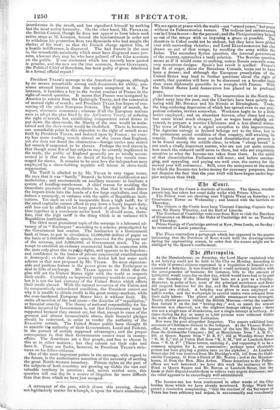President TYLER'S message to the American Congress, although by no
means remarkable among such documents for ability, pos- sesses unusual interest from the topics comprised in it. For instance, it furnishes a key to the recent conduct of France in the right-of-search question. It seems that France was instigated by America to retreat from the Quintuple Treaty, and the concession of mutual right of search ; and President TYLER has hopes of con- verting all the other European Powers. The right of search, he argues, obstructs commerce ; whereas if all the European nations were to adopt the plan fixed by the Ashburton Treaty, of refusing the right of search, but establishing independent naval forces to put down the slave-trade, the liberty of the seas would be main- tained and the slave-trade would be abolished. There is, however, one remarkable point in this objection to the right of search as set forth by President TYLER, and insisted upon by France : no coun- try has more trading vessels abroad on the ocean than England, yet she does not dread the obstruction—foreign navies may search her vessels if suspected to be slavers. Perhaps the real reason is, that though some few of her subjects may be covertly implicated in the trade, the public of England generally are so totally uncon- cerned in it that she has no dread of having her vessels rum- maged for slaves. It remains to be seen how the independent navy employed by a slave-holding republic will labour in slave-trade suppression.
The Tariff is alluded to by Mr. TYLER in very vague terms. He says that it was "hastily " framed ; he hints at modification and moderation ; and recommends an auxiliary measure to institute a system of bonding-warehouses. A chief reason for avoiding the immediate payment of import-duties is, that that it would throw the import-trade into the hands of a few large capitalists, and thus induce a monopoly, at variance with the spirit of Republican insti- tutions. Yet such an evil is inseparable from a high tariff; for if the small capitalist cannot afford to pay down a heavy import-duty, still less can he afford to let large parcels of goods lie for a long time together in a warehouse under bond. It should seem, there- fore, that the high tariff is the thing which is at variance with Republican institutions.
The third most prominent topic of the message is a laboured ad- vocacy of an " Exchequer" according to a scheme promulgated by the Government last session. The institution is a Government bank of issue, to put in circulation 15,000,000 dollars of paper on the basis of 5,000,000 dollars specie, reserved for the purpose out of the revenue, and 5,000,0001. of Government stock. The at- tempt to establish an ordinary commercial bank in connexion with the state only gives rise to pr,,,ty-fights, and appears to be hopeless ; and confidence in the issues of private commercial establishments is destroyed ; so that there seems no device left but some such scheme as that now proposed by Mr. TYLER. Its most objection- able and perilous feature is the power given to the Exchequer to deal iu bills of exchange. Mr. TYLER appears to think that the plan will set the United States right with the world as respects their credit. Certainly an improved currency would do some good, but it is not the bad currency of the United States which affects their credit abroad. With the natural resources of the Union, and its comparatively unburdened condition, the President cannot see why it is unable to obtain credit in the great money-markets, while the over-burdened European States have it without limit. He omits all mention of the real cause--the doctrine of "repudiation," or financial anarchy. The theory of national responsibility for lia- bilities incurred by Government is, not that Governments must be supported because they cannot err, but that, except in cases of the grossest and almost inconceivable abuse, their financial pledges should be redeemed, in order to render the authority of the Executive certain. The United States public have thought fit to unsettle this authority of their Governments, Local and Federal, in the pursuit of certain supposed advantages; and the proper consequence is, that their Governments cannot treat in money- affairs. The Americans are a free people, and free to choose in this as in other matters ; but they cannot eat their cake and have it. There are limits, however, to President TYLER'S stric- tures on his fellow-citizens.
One of the most important points in the message, with regard to the future, is the authoritative assertion of the necessity of settling the great North-western boundary. Private rights on the part of the subjects of both countries are growing up within the vast and valuable territory in question ; and, unless settled soon, this question will one day be a source of litigation far more difficult than that from which we have just escaped.






















 Previous page
Previous page